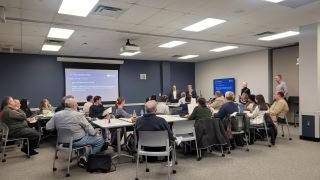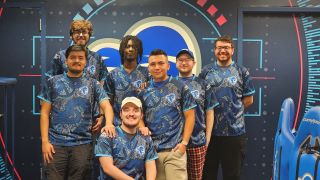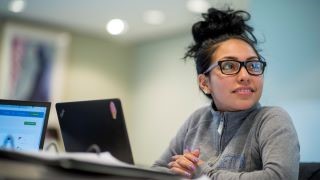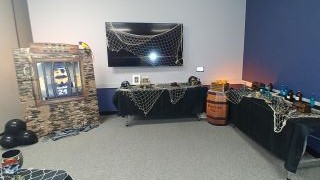Meta Visits Seton Hall to Showcase Immersive Technology
Thursday, February 29, 2024
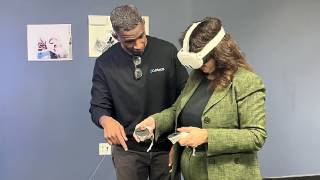 On February 7, the Teaching, Learning and Technology Center welcomed Meta representative, Vance Bass, to Space154 for an interactive demonstration of the cutting-edge Meta Quest 3 headset. The visit
aimed to showcase the transformative potential of virtual reality (VR) technology
in reshaping student learning and preparing for a technology-driven future workforce.
On February 7, the Teaching, Learning and Technology Center welcomed Meta representative, Vance Bass, to Space154 for an interactive demonstration of the cutting-edge Meta Quest 3 headset. The visit
aimed to showcase the transformative potential of virtual reality (VR) technology
in reshaping student learning and preparing for a technology-driven future workforce.
As one of the leading VR systems, Meta’s technology offers a wide range of educational opportunities. It leverages virtual, augmented, and mixed reality experiences to build skills and engage in virtual spaces without the boundaries of the physical world. The presentation was attended by 22 faculty members, staff, and administrators who were eager to explore immersive and interactive learning environments in the metaverse. The diverse range of colleges in attendance, including the Stillman School of Business, College of Nursing, College of Arts & Sciences, and Health and Medical Sciences, reflects the widespread interest in VR curricular integration across disciplines.
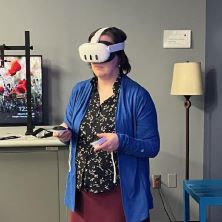 One notable aspect of the Meta visit was the hands-on experience provided to faculty
and administrators. Attendees had the chance to try the VR headset and discuss the
versatility and benefits of the technology in professional and academic settings.
The integration of VR in higher education offers numerous benefits, including enhanced
engagement, real-world simulations, active learning, accessibility, multi-sensory
learning, collaborative learning and skill development.
One notable aspect of the Meta visit was the hands-on experience provided to faculty
and administrators. Attendees had the chance to try the VR headset and discuss the
versatility and benefits of the technology in professional and academic settings.
The integration of VR in higher education offers numerous benefits, including enhanced
engagement, real-world simulations, active learning, accessibility, multi-sensory
learning, collaborative learning and skill development.
“Investing in virtual, augmented or mixed reality can revolutionize how students learn, collaborate, and engage with academic content, ultimately shaping a more dynamic and effective learning environment,” explains Renee Cicchino, director of instructional design and adjunct professor.
VR has already been incorporated in many ways at Seton Hall, from course activities to interview preparation. Leslie Rippon, Ph.D., in the School of Health and Medical Sciences, is working with VictoryXR to build an emergency preparedness simulation as a part of the first-year Interprofessional Education curriculum. This mixed reality scenario immerses students in a team-based response to a mass disaster, reinforcing clinical protocols and fostering interprofessional communication and decision-making skills.
Rippon emphasizes the significance of this approach, stating, “VR allows us to create flexible and adaptable learning environments that are expensive, difficult or dangerous to develop in the physical world, providing students with a low-stakes immersive learning space to practice skills they learn in their didactic coursework. Students in the immersive VR environment not only interact with the content visually but also experience auditory and sensory input, which enhances the experience for the learner.”
Similarly, Cicchino incorporates the award-winning VR experience, TheBlu, into her scuba diving course requirements. This virtual activity exposes students to an oceanic environment without the constraints of the physical world. Beyond curricular integration, the Career Center partners with a program called VirtualSpeech to conduct mock interviews and interview prep using VR headsets, highlighting the expansive potential that immersive technology has in shaping dynamic and impactful learning environments.
Meta's visit to Seton Hall has ushered in a new era of educational possibilities, with immersive technology poised to transform student learning and prepare them for the challenges of the future. The Seton Hall community's engagement with Meta marks a significant step toward embracing the future of education in the metaverse. If you are interested in learning more about VR and its benefits, please contact Renee Cicchino.
Categories: Science and Technology

